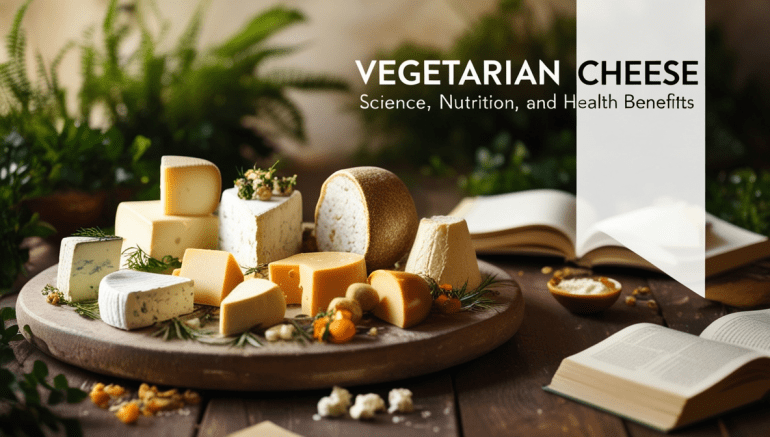Vegetarian Cheese: Science, Nutrition, and Health Benefits
Vegetarian cheese has gained significant popularity as more people opt for plant-based or vegetarian diets. This shift stems from health considerations, environmental concerns, and the ethical treatment of animals. Unlike traditional cheese made with animal rennet, vegetarian cheese uses alternative coagulating agents and is often created with plant-based ingredients. Here, we’ll explore the latest scientific findings on vegetarian cheese, its nutritional value, calorie content, and tips for choosing the best options.
What is Vegetarian Cheese?
Vegetarian cheese is crafted without using animal-derived rennet, an enzyme typically sourced from the stomach lining of ruminants like calves and goats, which is essential in traditional cheesemaking. Instead, vegetarian cheeses use microbial or fungal rennet, genetically engineered enzymes, or vegetable-based coagulating agents, making them suitable for vegetarians.
Scientific Innovations in Vegetarian Cheese
Scientific advancements have made it possible to create vegetarian cheese with textures and flavors closer to traditional dairy cheese. Some of the primary breakthroughs include:
- Genetically Modified Rennet: By isolating the gene responsible for producing rennet in animals and inserting it into microorganisms, scientists can create microbial rennet that mimics the action of animal rennet. This has been widely adopted for making vegetarian-friendly cheese.
- Fermentation-based Ingredients: Recent developments focus on fermentation techniques that use specific bacteria or yeast strains to create a more authentic dairy flavor and texture in plant-based and vegetarian cheeses.
- Bioengineering for Nutritional Parity: Some companies are exploring bioengineering to match the nutrient profile of dairy cheeses, ensuring vegetarian cheese options are rich in protein and essential vitamins.

Types of Vegetarian Cheese
Vegetarian cheese comes in several varieties, including:
- Dairy-based Vegetarian Cheese: Uses milk but without animal rennet, employing microbial or plant-based enzymes.
- Plant-based Cheese: Made from ingredients like nuts (cashews, almonds), soy, coconut, and even legumes, providing a dairy-free, vegan option.
- Cultured and Aged Vegetarian Cheese: Crafted using traditional culturing methods to develop tangy flavors and firm textures, often from plant bases.

Nutritional Profile of Vegetarian Cheese
Vegetarian cheeses vary in nutritional content depending on their ingredients. Generally, they offer a mix of protein, fats, vitamins, and minerals. Here’s a breakdown of the nutritional profile of popular vegetarian cheese types.
| Nutrient (per 1 oz) | Dairy-Based Veg Cheese | Nut-based Cheese | Soy-based Cheese |
|---|---|---|---|
| Calories | ~100 kcal | ~80 kcal | ~70 kcal |
| Protein | 5-7 g | 3 g | 4-5 g |
| Total Fat | 8 g | 7-10 g | 4-6 g |
| Saturated Fat | 5 g | 1 g | 0.5 g |
| Calcium | 200 mg | 80 mg | 100 mg |
| Vitamin B12 | 0.4 mcg | 0 mcg | 0.3 mcg |
| Sodium | 200 mg | 150 mg | 180 mg |
Note: These values may vary by brand and ingredients used.

Caloric Content of Vegetarian Cheese
Below is a table summarizing the calorie content of various vegetarian cheeses.
| Cheese Type | Calories (per 1 oz) |
|---|---|
| Dairy-Based Veg Cheese | 100-120 kcal |
| Cashew-based Cheese | 80-90 kcal |
| Almond-based Cheese | 80-85 kcal |
| Coconut Oil-based Cheese | 70-85 kcal |
| Soy-based Cheese | 70-80 kcal |

Health Benefits of Vegetarian Cheese
- Rich in Essential Nutrients: Vegetarian cheese, especially dairy-based, retains high calcium, protein, and vitamin B12 levels. Plant-based options can be fortified to match these nutrients, supporting bone health and energy production.
- Lower Saturated Fat Content: Nut-based and soy cheeses typically contain less saturated fat than traditional dairy cheese, which may benefit heart health.
- Good Source of Fiber: Unlike dairy, some plant-based cheeses are high in fiber, especially when made from nuts or legumes. Fiber aids digestion and helps maintain healthy blood sugar levels.
- Free from Animal Products: Vegetarian and vegan cheeses offer an ethical alternative without sacrificing taste and texture, ideal for those avoiding animal products.
Vegetarian Cheese and Lactose Intolerance
Dairy-based vegetarian cheeses still contain lactose, but plant-based cheeses are naturally lactose-free, making them an excellent choice for individuals with lactose intolerance or dairy sensitivity.
Choosing the Best Vegetarian Cheese
- Check Ingredients: Look for cheeses made with natural, high-quality ingredients. Avoid highly processed options with additives.
- Look for Nutrient Fortification: Choose brands that fortify with B12, calcium, and vitamin D for a nutritional boost.
- Taste and Texture: Different brands offer unique flavors and textures. Try a few to find one that suits your preferences.
Popular Vegetarian Cheese Brands
- Dairy-based Vegetarian Cheeses: Cabot Creamery, Tillamook, and BelGioioso.
- Plant-based Vegetarian Cheeses: Kite Hill (almond), Violife (coconut), Miyoko’s Creamery (cashew), and Daiya (soy-based).
Each brand offers a variety of flavors, including cheddar, mozzarella, and cream cheese alternatives, allowing for a range of culinary uses.
Vegetarian cheese is a versatile, nutritious, and ethical alternative to traditional cheese. Whether you choose dairy-based or plant-based options, vegetarian cheese allows you to enjoy rich flavors, add protein to meals, and support a vegetarian or vegan lifestyle. With advancements in food science, vegetarian cheese is closer than ever to traditional cheese in taste, texture, and nutritional content.


